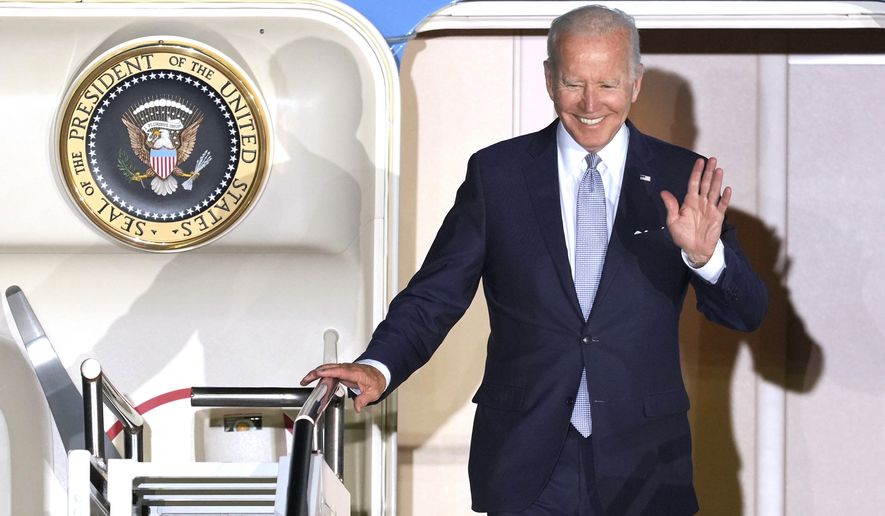President Biden touched down in Europe on Saturday for a series of high-profile summits with Group of Seven and NATO leaders as the administration looks to support key alliances in a region still grappling with the fallout from Russia’s assault on Ukraine while expanding efforts to counter China’s growing influence around the globe.
Four months into the war in Ukraine, the trip presents an important test for the administration to shore up resolve among its allies to continue maintaining pressure on Russia amid growing economic hardships and the prospects of a long war of attrition in Ukraine setting in.
Mr. Biden’s itinerary begins in Schloss Elmau, Germany on Sunday with bi-lateral talks with German Chancellor Olaf Scholz in what administration officials called a “signals check” ahead of the G7 summit. The two leaders are expected to discuss both countries’ ongoing efforts to assist Ukraine and hold Russia accountable ahead of the full summit.
The president will then attend a series of panels on infrastructure, climate and foreign policy with his other G7 counterparts, beginning with a discussion on the global economy for which the war in Ukraine will remain a central topic.
“You can be sure that leaders are going to be talking about core problems that are on the top of mind for all of us across the board, like rising prices, supply chain disruptions, all exacerbated by this war in Ukraine and by Mr. Putin’s decision,” Nation Security Spokesman John Kirby told press Saturday in a preview of the trip aboard Air Force One.
Officials will also focus on the growing food crisis spurred by the war, which the United Nations warns could throw tens of millions of people into hunger. Western leaders have accused Russia of weaponizing food by blocking access to Ukraine’s vast grain stores.
Later in the week, Mr. Biden will travel to Madrid, Spain for two days of talks with NATO allies which will also be shaped extensively by the ongoing conflict.
Mr. Biden has been a staunch backer of Finland and Sweden’s bids to join the alliance, which was spurred in part by Russia’s invasion of Ukraine.
The countries require unanimous support from existing NATO members, before being admitted, and the alliance has been shaken in recent weeks by Turkey’s opposition to the two countries joining the bloc.
Administration officials have declined to say whether Mr. Biden will meet with Turkish president, Recep Tayyip Erdogan during the summit.
The U.S. and other member states have expressed optimism that Turkey will overcome its differences with the two countries.
While the war in Ukraine and its expanding consequences will be the key focus of both summits, the administration also hopes to show resolve and build consensus in countering China’s growing influence.
NATO has invited leaders from Japan, South Korea, New Zealand and Australia to the summit in a symbolic step that has been met with swift blowback from Beijing.
Mr. Biden is also expected to launch its partnership for global infrastructure meant to counter China’s Belt and Road Initiative in the developing world. The partnership to be announced this year builds upon the “Build Back Better World” initiative introduced at last year’s G7 summit.
“China will be a significant focus here for the G7, and the impact that China’s coercive, economic practices, use of forced labor, intellectual theft — all those are front and center for the nations of the G7,” Mr. Kirby said. “And I think you’re going to see China very much at the forefront as the G7 goes on.”
-This story includes wire reports.
• Joseph Clark can be reached at jclark@washingtontimes.com.




Please read our comment policy before commenting.